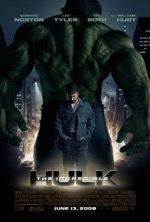The Incredible Hulk (PG-13)

Starring: Edward Norton
June 2008
“A Giant Green Leap Past Lee’s Stylized Flop”
Is there a better word to describe the 2003 version of The Hulk than debacle? Director Ang Lee delivered a cerebral comic-to-movie adaptation that was so painstakingly adherent to its 2D, four-color source material it turned off a large segment of the audience with its dizzying 24-style split screen boxes, headache-inducing action sequences and an angry green giant who fluctuated in size and could leap several miles with every bound. It may have been the ultimate Valentine to the comic book and its fans, but it wasn’t great cinema—judging from its critical rejection and tepid box office.
Compared to Lee’s avant-garde wild pitch, director Louis Leterrier’s vision for the Hulk is right in the middle of the strike zone, and will appeal to fanboys as well as a mass audience. The Incredible Hulk isn’t technically a sequel to The Hulk; more like a re-envisioning. In addition to a change at the helm, the entire cast has been overhauled: Edward Norton as Bruce Banner/Hulk, Liv Tyler as Betty Ross, William Hurt as General ‘Thunderbolt’ Ross and Tim Roth at Col. Emil Blonsky/Abomination.
Norton’s performance is flawless, but the rest of the cast has a hard time fitting into their characters—ironic since, initially, Norton as a superhero seemed like the most dubious piece of casting. Hurt is serviceable but a bit stiff as Gen. Ross, a crusty old war dog who constantly demands bigger guns and more backup. Tyler is too soft-spoken in her likewise understated turn—the Lord of the Rings actress defaults to her Elvish serenity in a role that required a wider emotional range. Roth is skilled at making bad guys believable, but here the actor is powerless to forge swaggering hothead, Blonsky, into a viable villain. The entire cast is victimized by shallow character development from writer Zak Penn. Assuming that his audience is already aware of the Hulk’s back-story, the ironically named Penn does little to expand the boundaries of the characters beyond what’s been established in the comic book. In essence, the characters kowtow to the rhythm and demands of the script. The word contrived comes to mind.
And speaking of contrived, the climactic battle between The Hulk and The Abomination—which comes complete with a Godzilla-style rampage through the streets of NYC—is a conventional resolution that caps a twenty-six minute slugfest between the mutant titans. The sequence is a surfeit of eye candy which, appropriately, comes crashing down after the sugar high of car tramplings, helicopter hurlings and Hulk smashings wears off. Strangulation as a means of vanquishing a foe is extremely banal and renders the eagerly anticipated climax that much more disappointing.
There are many other disappointing elements in the film, like Bruce’s perpetual inability to give Gen. Ross’ men the slip. The early stages of the film establish Bruce as an expert at lying low, so why can’t he simply disappear again? And then there’s the flaccid love triangle between Bruce, Betty and one of Betty’s colleagues (he’s in the movie for maybe five minutes and I don’t remember his name). As soon as Bruce resurfaces, Betty (apparently) dumps her boyfriend and returns to Bruce’s side as if nothing had happened during his absence. The whole sordid mess is quickly and conveniently set aside to make way for another action scene. There’s that word again…
Contrived as it is, there are some entertaining aspects to the film. Besides Norton’s finely attenuated performance, there are several amusing cameos: Stan Lee and Lou Ferrigno reprise their brief stints from Lee’s Hulk, and Robert Downey Jr. shows up as Tony Stark. Stark’s alter ego, in case you’ve been on an extended vacation off-planet, is Iron Man. Stark’s presence here marks the first cross-pollination of superheroes in a Marvel movie and also lays the groundwork for a much anticipated Avengers movie.
The Hulk is one of the finest examples of Man vs. Himself in modern mythology, and though angst hovers over the movie like a dark cloud, Leterrier, fortunately, doesn’t let it consume the film. The director pays fitting tribute to Bill Bixby, who played small screen Banner from 1977 to 1982, by revealing a brief glimpse of the actor on a TV in the background of Banner’s flat. Composer Craig Armstrong also pays homage to the TV series by employing a clever statement of “The Lonely Man” theme in his score.
Even though The Incredible Hulk underachieves, it’s still a giant leap ahead of its predecessor. Rumors persist that Norton was dissatisfied with the final cut of the film, so we’ll see if he comes back to join Barry Bonds in Hulk III: Steroid Smackdown.
Rating: 2 1/2